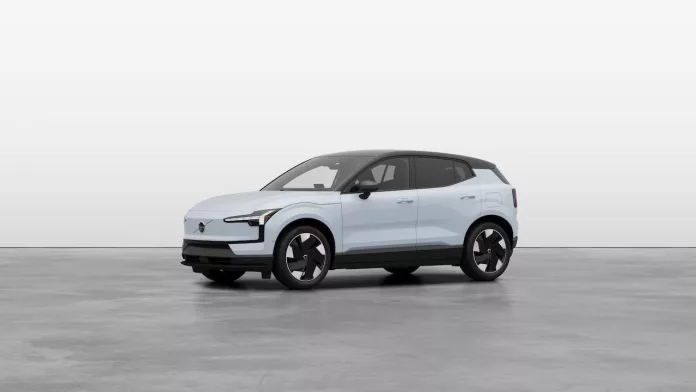Electric vehicles (EVs) have been an emblem of advancement in reducing direct emissions from cars, yet they are still comprised of various parts that contribute to environmental impact through their supply chains. Both new players and established automotive brands are diving into innovative ways to mitigate these impacts, a trend closely monitored. A prime example of such innovation is Volvo‘s EX30 which includes bio-based materials in its design.
The Alluring Attributes of Volvo’s EX30
Volvo has entered the electric vehicle arena with the impressively priced EX30 at $34,950 in the US. This five-seater SUV not only advocates affordability but also offers a generous city-driving range initiating at 295 miles, with potential upgrades boosting it significantly. Its combined safety features and performance metrics have also garnered attention.
What distinguishes the Volvo EX30 further is its commitment to sustainability. The vehicle integrates recycled materials substantially, with approximately 25% of its aluminum, along with significant portions of steel and plastics, coming from recycled sources. This thoughtful approach extends to the integration of Bcomp‘s bio-based materials, a move that promises a lighter vehicle, enhancing both battery efficiency and tire longevity.
Biobased Innovation in Auto Manufacturing
Bcomp’s AmpliTex™ and PowerRibs™ Leading the Charge
Bcomp has introduced its ampliTex™ flax-fiber composites into the Volvo EX30, contributing to a lighter, more ecologically responsible vehicle. The flax used in ampliTex™ hails from European farms, offering environmentally conscious reinforcement that doesn’t compromise on robustness or styling.
The company’s bio-based composites offer a sustainable alternative to materials like carbon fiber and plastics. Despite being used only in the EX30’s interior dashboard and door trims, these components signify an important step toward more sustainable automobile manufacturing, much like Ford‘s adoption of upcycled fishing nets for auto parts.
Pushing Boundaries in Motorsports
While mainstream vehicles gradually adopt bio-based materials, motorsports have leaped forward in their use. Bcomp’s natural fiber composites have been tested in rigorous environments, including renowned racing events like Formula 1 and Formula E. The Extreme E off-road event demonstrated the capabilities of Bcomp’s material, supplanting traditional carbon fiber with a more sustainable and just as effective alternative, amplifying both vehicle safety and driver comfort.
Transition to Sustainable Automotive Components
A Broader Future for Bio-based Materials
Beyond motorsports, Bcomp’s materials have ventured into the realm of luxury yachts and space technology with the European Space Agency. Their recent Series C funding boost indicates a bright future for these materials in broader applications, from public transportation to aerospace.
With sustainability as a driving force, Bcomp estimates that their materials could slash plastic content by up to 70% in car interiors, potentially cutting down CO2 emissions during pre-use phases by as much as 60%. The implication is clear: eco-friendly components can dramatically reduce the environmental footprint of the automotive industry across vehicle classes.
Contributing to a Greener Automotive Industry
As the electric vehicle industry accelerates, so too must efforts towards holistic sustainability. Consumers play a critical role by influencing manufacturers to not only address tailpipe emissions but to also scrutinize and improve lifecycle emissions from the entirety of their supply chains.
Bcomp’s CEO and Co-Founder, Christian Fischer, acknowledges the urgency of this transition to decarbonization, underpinned by consumer demand and a committed investment community. He underscored the vital balance between carbon neutrality and meeting the high-performance needs of clients.
Focusing on other automotive aspects, such as tires, reveals further opportunities for eco-friendly advancements. EV tires wear and tear contribute microplastics to the environment, a concern being addressed through innovations like rubber synthesized from dandelion sap. It illustrates the evolving ethos in vehicle manufacturing – a drive toward sustainable practices without sacrificing quality or performance.

























